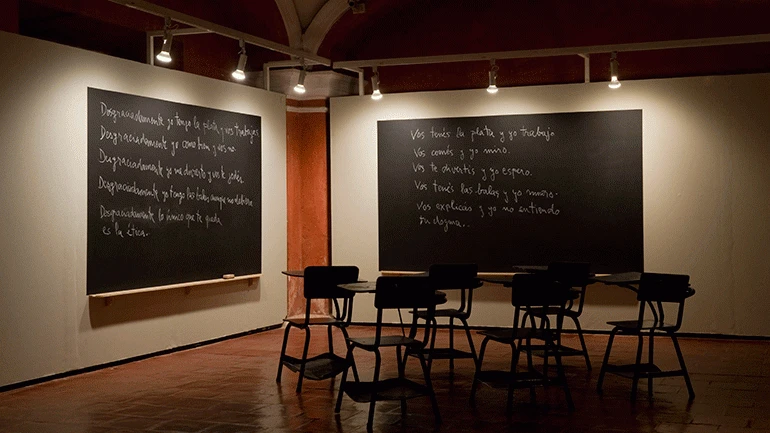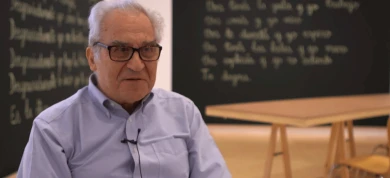Towards a Socialism of Creation
Luis Camnitzer in conversation with María Acaso and Selina Blasco

Held on 17 Oct 2018
Inside the framework of the retrospective Luis Camnitzer: Hospice of Failed Utopias (17 October 2018 to 4 March 2019) and the launch of the studies, residencies and cultural productions programme the Perturbable School, this encounter sees the artist touch on his conception of critical artistic pedagogy, not only in schools and universities but also museums, and on where this work of reflection fits into his own artistic career.
Luis Camnitzer (Lübeck, 1937) views conceptual art as a practice of political intervention in a repressed public sphere. This occurs in his art and curation work, demonstrated by the influential landmark exhibition Global Conceptualism: Points of Origin, 1950s-1980s (conceived with Jane Farver and Rachel Weiss at New York’s Queens Museum in 1999). In the same manner, Camnitzer is one of the most incisive thinkers with regard to the relationship between art and education, an issue which has led him to consider the different possibilities in the museum institution, the art object, spectators and even the role of art.
Upon what are his ideas of education and art based? In opposition with predominant ideas, which see learning as being contingent upon an explanation of the art work, Camnitzer endorses the integration of both, thus enabling this traditional dependency to be subverted and seeking alternatives to market logic, where art is conceived to produce the art object and education is viewed as training towards a particular end. According to Camnitzer, in this new relationship “education is art and art is education”. This new idea of art, moreover, entails radically questioning the limits of the museum and the artwork; in the words of the artist, which lend this debate its name, “Liberating the spectator so they think about everything they do artistically, and helping them to create a socialism of creation”.
With the collaboration of
In the framework of
An education programme developed with the patronage of
Educational program developed with the sponsorship of

Participants
María Acaso is head of Education at the Museo Reina Sofía. A teacher and theorist, her reflections include the concept of “educational revolution”, a method of action to develop an alternative teaching practice. Her publications include Art Thinking: un libro que revolucionará la manera de educar (2017) and La educación artística no son manualidades. Nuevas prácticas en la enseñanza de las artes y la cultura visual (2014), and she is the founder of Invisible Pedagogies, a collective of disruptive education.
Selina Blasco is a professor of Art History in the Faculty of Fine Arts at the Complutense University of Madrid. The collective initiatives she has worked on include “Sin créditos” (Without Credits), a programme based on learning as an experimental process. She is also one of the academic coordinators in the MA on Contemporary Art History and Visual Culture run by the Museo Reina Sofía.
Luis Camnitzer is an artist, educator and theorist who has exhibited his work at the Venice Biennale, the São Paulo Biennial, the Whitney Museum and documenta, Kassel, to name but a few. Moreover, his work belongs to the Collections of MoMA (New York), the Getty Museum (Los Angeles), Tate Modern (London), the Blanton Museum (Austin, Texas), the Cisneros Collection (Caracas/New York) and the Museo Reina Sofía (Madrid). His publications most notably include Arte y Enseñanza: La ética del poder (2000) and Didáctica de la liberación. Arte conceptualista latinoamericano (2009), and he was the pedagogical curator at the 6th Mercosul Biennial and the Iberé Camargo Foundation (Porto Alegre) between 2007 and 2010.
Más actividades

Institutional Decentralisation
Thursday, 21 May 2026 – 5:30pm
This series is organised by equipoMotor, a group of teenagers, young people and older people who have participated in the Museo Reina Sofía’s previous community education projects, and is structured around four themed blocks that pivot on the monstrous.
This fourth and final session centres on films that take the museum away from its axis and make it gaze from the edges. Pieces that work with that which is normally left out: peripheral territories, unpolished aesthetics, clumsy gestures full of intent. Instead of possessing an institutional lustre, here they are rough, precarious and strange in appearance, legitimate forms of making and showing culture. The idea is to think about what happens when central authority is displaced, when the ugly and the uncomfortable are not hidden, when they are recognised as part of the commons. Film that does not seek to be to one’s liking, but to open space and allow other ways of seeing and inhabiting the museum to enter stage.
![Tracey Rose, The Black Sun Black Star and Moon [La luna estrella negro y negro sol], 2014.](https://recursos.museoreinasofia.es/styles/small_landscape/public/Obra/AD07091_2.jpg.webp)
On Black Study: Towards a Black Poethics of Contamination
Monday 27, Tuesday 28 and Wednesday 29 of April, 2026 – 16:00 h
The seminar On Black Study: Towards a Black Poethics of Contamination proposes Black Study as a critical and methodological practice that has emerged in and against racial capitalism, colonial modernity and institutional capture. Framed through what the invited researcher and practitioner Ishy Pryce-Parchment terms a Black poethics of contamination, the seminar considers what it might mean to think Blackness (and therefore Black Study) as contagious, diffuse and spreadable matter. To do so, it enacts a constellation of diasporic methodologies and black aesthetic practices that harbor “contamination” -ideas that travel through texts, geographies, bodies and histories- as a method and as a condition.
If Blackness enters Western modernity from the position of the Middle Passage and its afterlives, it also names a condition from which alternative modes of being, knowing and relating are continually forged. From within this errant boundarylessness, Black creative-intellectual practice unfolds as what might be called a history of touches: transmissions, residues and socialities that unsettle the fantasy of pure or self-contained knowledge.
Situated within Black radical aesthetics, Black feminist theory and diasporic poetics, the seminar traces a genealogy of Black Study not as an object of analysis but as methodological propositions that continue to shape contemporary aesthetic and political life. Against mastery as the horizon of study, the group shifts attention from what we know to how we know. It foregrounds creative Black methodological practices—fahima ife’s anindex (via Fred Moten), Katherine McKittrick’s expansive use of the footnote, citation as relational and loving labour, the aesthetics of Black miscellanea, and Christina Sharpe’s practices of annotation—as procedures that disorganise dominant regimes of knowledge. In this sense, Black Study is approached not as a discrete academic field but as a feel for knowing and knowledge: a constellation of insurgent practices—reading, gathering, listening, annotating, refusing, world-making—that operate both within and beyond the university.
The study sessions propose to experiment with form in order to embrace how ‘black people have always used interdisciplinary methodologies to explain, explore, and story the world.’ Through engagements with thinkers and practitioners such as Katherine McKittrick, C.L.R. James, Sylvia Wynter, Christina Sharpe, Fred Moten, Tina Campt, Hilton Als, John Akomfrah, fahima ife and Dionne Brand, we ask: What might it mean to study together, incompletely and without recourse to individuation? How might aesthetic practice function as a poethical intervention in the ongoing work of what Sylvia Wynter calls the practice of doing humanness?

Intergenerationality
Thursday, 9 April 2026 – 5:30pm
This series is organised by equipoMotor, a group of teenagers, young people and older people who have participated in the Museo Reina Sofía’s previous community education projects, and is structured around four themed blocks that pivot on the monstrous.
The third session gazes at film as a place from which to dismantle the idea of one sole history and one sole time. From a decolonial and queer perspective, it explores films which break the straight line of past-present-future, which mix memories, slow progress and leave space for rhythms which customarily make no room for official accounts. Here the images open cracks through which bodies, voices and affects appear, disrupting archive and questioning who narrates, and from where and for whom. The proposal is at once simple and ambitious: use film to imagine other modes of remembering, belonging and projecting futures we have not yet been able to live.

Remedios Zafra
Thursday March 19, 2026 - 19:00 h
The José Luis Brea Chair, dedicated to reflecting on the image and the epistemology of visuality in contemporary culture, opens its program with an inaugural lecture by essayist and thinker Remedios Zafra.
“That the contemporary antifeminist upsurge is constructed as an anti-intellectual drive is no coincidence; the two feed into one another. To advance a reactionary discourse that defends inequality, it is necessary to challenge gender studies and gender-equality policies, but also to devalue the very foundations of knowledge in which these have been most intensely developed over recent decades—while also undermining their institutional support: universities, art and research centers, and academic culture.
Feminism has been deeply linked to the affirmation of the most committed humanist thought. Periods of enlightenment and moments of transition toward more just social forms—sustained by education—have been when feminist demands have emerged most strongly. Awareness and achievements in equality increase when education plays a leading social role; thus, devaluing intellectual work also contributes to harming feminism, and vice versa, insofar as the bond between knowledge and feminism is not only conceptual and historical, but also intimate and political.
Today, antifeminism is used globally as the symbolic adhesive of far-right movements, in parallel with the devaluation of forms of knowledge emerging from the university and from science—mistreated by hoaxes and disinformation on social networks and through the spectacularization of life mediated by screens. These are consequences bound up with the primacy of a scopic value that for some time has been denigrating thought and positioning what is most seen as what is most valuable within the normalized mediation of technology. This inertia coexists with techno-libertarian proclamations that reactivate a patriarchy that uses the resentment of many men as a seductive and cohesive force to preserve and inflame privileges in the new world as techno-scenario.
This lecture will address this epochal context, delving into the synchronicity of these upsurges through an additional parallel between forms of patriarchal domination and techno-labor domination. A parallel in which feminism and intellectual work are both being harmed, while also sending signals that in both lie emancipatory responses to today’s reactionary turns and the neutralization of critique. This consonance would also speak to how the perverse patriarchal basis that turns women into sustainers of their own subordination finds its equivalent in the encouraged self-exploitation of cultural workers; in the legitimation of affective capital and symbolic capital as sufficient forms of payment; in the blurring of boundaries between life and work and in domestic isolation; or in the pressure to please and comply as an extended patriarchal form—today linked to the feigned enthusiasm of precarious workers, but also to technological adulation. In response to possible resistance and intellectual action, patriarchy has associated feminists with a future foretold as unhappy for them, equating “thought and consciousness” with unhappiness—where these have in fact been (and continue to be) levers of autonomy and emancipation.”
— Remedios Zafra

27th Contemporary Art Conservation Conference
Wednesday, 4, and Thursday, 5 March 2026
The 27th Contemporary Art Conservation Conference, organised by the Museo Reina Sofía’s Department of Conservation and Restoration, with the sponsorship of the Mapfre Foundation, is held on 4 and 5 March 2026. This international encounter sets out to share and debate experience and research, open new channels of study and reflect on conservation and the professional practice of restorers.
This edition will be held with in-person and online attendance formats, occurring simultaneously, via twenty-minute interventions followed by a five-minute Q&A.

